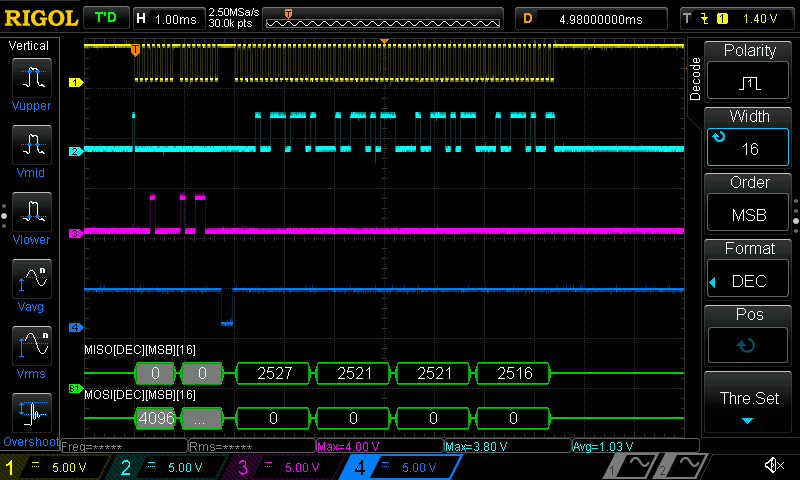Simple test code with an max11626eee

Diff: main.cpp
- Revision:
- 0:afa6a5e2d11a
--- /dev/null Thu Jan 01 00:00:00 1970 +0000
+++ b/main.cpp Wed Jul 27 19:35:48 2016 +0000
@@ -0,0 +1,132 @@
+#include "mbed.h"
+
+DigitalOut myled(LED1);
+DigitalOut convst(p18); // Conversion Start (active low)
+DigitalOut cs(p16); // Chip Select (active low)
+DigitalIn eoc(p20); // End of Conversion (active low)
+SPI spi(p11, p12, p13); // mosi, miso, sclk
+Serial pc(USBTX, USBRX); // tx, rx
+
+#define AIN0 0u
+#define AIN1 1u
+#define AIN2 2u
+#define AIN3 3u
+#define AIN4 4u
+#define AIN5 5u
+#define AIN6 6u
+#define AIN7 7u
+#define AIN8 8u
+#define AIN9 9u
+#define AIN10 10u
+#define AIN11 11u
+#define AIN12 12u
+#define AIN13 13u
+#define AIN14 14u
+#define AIN15 15u
+
+#define SCAN_TO_N 0u // Scans channels 0 through N.
+#define SCAN_N_TO 1u // Scans channels N through the highest numbered channel.
+#define SCAN_N_AVG 2u // Scans channel N repeatedly. The averaging register sets the number of results.
+#define SCAN_OFF 3u // No scan. Converts channel N once only
+
+#define CLKSEL_INT_INT_CNVST 0u // Internal clock, internal aqcuisition, convst
+#define CLKSEL_INT_EXT_CNVST 1u // Internal clock, external aqcuisition convst, convst
+#define CLKSEL_INT_INT_ADC 2u // Internal clock, internal aqcuisition, extra channel
+#define CLKSEL_EXT_EXT_ADC 3u // External clock, external aqcuisition sclk, extra channel
+
+#define REFSEL_INT_SLEEP 0u // Reference off after scan; need wake-up delay
+#define REFSEL_EXT 1u // Reference off; no wake-up delay.
+#define REFSEL_INT_NOSLEEP 2u // Reference always on; no wake-up delay.
+#define REFSEL_RESERVED 3u // Reserved. Do not use.
+
+#define NAVG_4 0u // Performs four conversions and returns the average for each requested result.
+#define NAVG_8 1u // Performs eight conversions and returns the average for each requested result.
+#define NAVG_16 2u // Performs 16 conversions and returns the average for each requested result.
+#define NAVG_32 3u // Performs 32 conversions and returns the average for each requested result.
+
+#define NSCAN_4 0u // Scans channel N and returns four results.
+#define NSCAN_8 1u // Scans channel N and returns eight results.
+#define NSCAN_12 2u // Scans channel N and returns 12 results.
+#define NSCAN_16 3u // Scans channel N and returns 16 results.
+
+uint8_t compile_reset(bool fifo_only){
+ if(fifo_only)
+ return 0x18;
+ else
+ return 0x10;
+}
+
+uint8_t compile_conversion(uint8_t ch, uint8_t scan){
+ return 0x80 | ((ch&0xF)<<3)|((scan&0x3)<<1);
+}
+
+uint8_t compile_setup(uint8_t clk, uint8_t ref){
+ return 0x40 | ((clk&0x3)<<4)|((ref&0x3)<<2);
+}
+
+uint8_t compile_avg(bool avgon, uint8_t navg, uint8_t nscan){
+ uint8_t y = 0x20;
+ if(avgon) y |= 0x10;
+ y |= ((navg&0x3)<<2)|(nscan&0x3);
+ return y;
+}
+
+int main() {
+ int data[4];
+ convst = 1;
+ cs = 1;
+
+ // The max11626 uses normal 8 bit spi for the registers.
+ // However, >8 bit reads can be used to read the data (mosi would be 0 during read).
+ spi.format(8,3);
+ spi.frequency(10000);
+
+ // MAX11626 addressing.
+ // Addressing is performed by the leading zeros.
+ // - no leading zero (0x80) would be the conversion register.
+ // - one leading zeros (0x40) would be the setup register.
+ // - two leading zeros (0x20) would be the averaging register.
+ // - 3 leading zeros (0x10) would be the reset register.
+ // Transfers are MSB first.
+ // Reading data is always safe when you set MOSI to 0.
+
+ // Let the scope settle after reset
+ wait(1);
+
+ while(1) {
+ // Write reset full.
+ cs = 0;
+ spi.write(compile_reset(0));
+ cs = 1;
+
+ wait_us(100);
+
+ // Write conversion
+ cs = 0;
+ spi.write(compile_conversion(AIN3, SCAN_TO_N));
+ cs = 1;
+
+ wait_us(100);
+
+ convst = 0;
+ wait_us(100);
+ convst = 1;
+
+ wait_us(100);
+
+ cs = 0;
+ // Read 4
+ for(int i=0; i<4; i++){
+ data[i] = 0;
+ data[i] = spi.write(0);
+ data[i] <<= 8;
+ data[i] |= spi.write(0);
+ }
+ cs = 1;
+
+ pc.printf("%05d, %05d, %05d, %05d\n",data[0],data[1],data[2],data[3]);
+ wait(0.2);
+
+ myled = !myled;
+ }
+}